
|
|
Interview with Rom Di Prisco (January 2011)
Rom Di Prisco (aka Morphadron) is an electronic artist and game composer best known for his works on driving franchises such as Need For Speed and Full Auto, as well as instalments of the SSX and Unreal Tournament series. He returned to the spotlight at the end of 2010 when he released his debut solo album, Cryptidalia, as a free download.
In this fascinating interview, Rom Di Prisco reflects in detail his experiences working with Electronic Arts on Need For Speed and other major titles, noting how he pioneered experimental electronic and adaptive music in video games. He moves on to discuss his more recent works, including a number of cancelled projects, before reflecting on the concepts and production of Cryptidalia.
Interview Credits
Interview Subject: Rom Di Prisco
Interviewer: Chris Greening
Editor: Chris Greening
Coordination: Chris Greening
Interview Content
Chris: Rom Di Prisco, it is an honour to speak to you today after the release of your debut album. You have revealed that two of your main passions in life are music and video games. Could you elaborate on how you became interested in these areas and went on to pursue them together through creating video game music?
Rom Di Prisco: Thanks very much Chris, I actually frequent the site regularly, so it's totally my pleasure! I started playing video games and dabbling with electronic music back in the late 70s / early 80s, from a young age, and have been hooked ever since. I would hang out in the local arcades playing stuff like Robotron, Centipede, Pac-Man... or at home playing the Atari ST, which I also used for making my early music.
I was pursuing my dream of being a recording artist, with various bands and projects in the late 80s and early 90s, and had some moderate success with live shows, recording deals... but then one day I popped Wipeout into my brand new PS1 (back in 1995) and was completely blown away by the gameplay, visuals, and the music of Tim Wright. The music was very similar to the stuff I was producing for dance labels, and a light bulb went off in my head. I started madly researching game companies and sending out demos on cassette tape (I'm serious) to game developers.
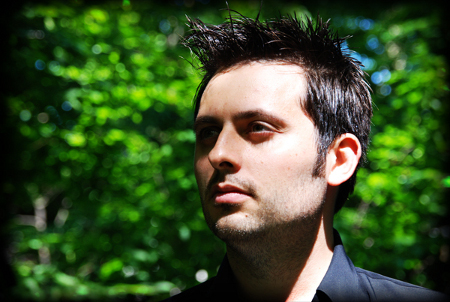
Chris: Your demos reveal that you are a particularly versatile composer, though your speciality is electronic music. Over the years, how you simultaneously gained versatility while developing an individual style? Are there any musical influences that have been particularly important to you?
Rom Di Prisco: It's been a very natural flow, I have stayed true to what I love, and what I know, while constantly learning and expanding my horizons at the same time. For instance, the Dead Man's Hand project was something very different for me. I remember hearing about the concept for the first time; my original reaction was how on earth am I going to make old western music, haha... But they wanted something more original than that — western music mixed with modern elements like trip-hop and downtempo electronica. It was great having something I was comfortable with while at the same time having the excitement of trying something new.
Growing up, I was heavily influenced by artists such as Skinny Puppy, Kraftwerk, Nitzer Ebb, I Start Counting, The Cure, and then later Leftfield, The Prodigy, and Underworld, to name a few.
Chris: You first came to attention as the composer for the Need For Speed series. What was it like to become part of this franchise on its second instalment? How did you assert yourself on this title while building upon the foundations established by Jeff van Dyck and Saki Kaskas?
Rom Di Prisco: It was a very exciting time. Electronica was gaining popularity, and I was brought in to fill in the gaps on the electronic side of things. Saki and Jeff were the masters of all things rock, so it was two different styles of music to compliment each other and offer something new to the listener. In later installments I had the pleasure of working closely with Saki, and I would add synth work to his tracks, and he would produce guitars for my tracks. Although we came from different musical backgrounds, we both had exactly the same thoughts about music, and we came up with some really great stuff together.
Chris: Since this debut, you have gone on to work on four other main titles in the series, Hot Pursuit, High Stakes, Porsche Unleashed, and Hot Pursuit II. How did your approach to creating electronic tracks develop during the series' evolution? How liberated did you feel when composing for these titles and to what extent were you influenced by their specific scenarios?
Rom Di Prisco: Hot Pursuit was the first Need For Speed title where I worked on the actual in-game music rather than just menu and showcase pieces. The music was interactive, which was pretty revolutionary for the time, considering it was streaming on a PS1 with branching sections and different music for the various locations in the game world.
Each NFS title had its own unique gameplay elements. This definitely influenced how the music progressed and morphed over the years to match what was needed for each project. I always tried to come up with something a little different than what you might hear from music releases at the time — stuff that maybe you couldn't get away with on a record label, and that hadn't gained popularity yet back in the day. For instance, mixing a melodic trance track with elements of drum n bass or combining an industrial vibe with a breakbeat track.
How liberated did I feel composing for these titles? Maybe too liberated! Not many people were even familiar with that style of music back then. There was very little direction musically, which can be both good and bad, and I was basically left to try anything and everything.
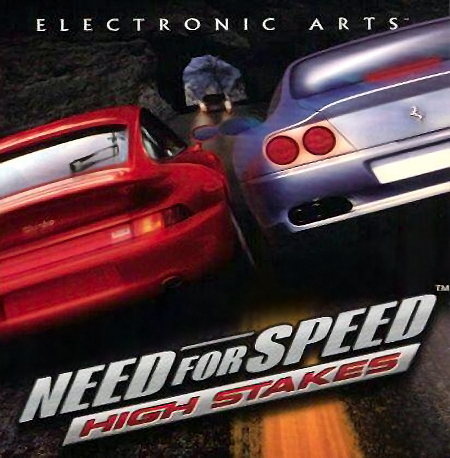
Chris: Many of your main racing themes on the Need For Speed series have gone on to become fan favourites. Of all the music you have contributed to the Need For Speed series, which three tracks do you consider your personal favourites and why?
Rom Di Prisco: Ohhh, that's a tough question! That might be better answered by the fans, and for me it's hard to say... I can easily tell you which tracks are fan favourites by the amount of emails I still get about them, almost on a daily basis. It is very humbling and pretty amazing considering some of these tracks were written with very dated gear, almost 15 years ago now. Some of the fan favourites are: NFS 2 Main Menu, NFS 2 Special Edition Menu, and Aquila 303.
My picks would probably include any track from Need For Speed: High Stakes. With all of today's technology you just can't beat some of the old 8 bit and 12 bit samplers. I would sample and resample my own synth riffs just to add extra crunch. The raw sound of hardware synths running through old cheap outboard gear and effects processors was always good fun. Another pick would be Callista. It's technically Saki Kaskas's song, but I did some synth work and production on it. It's just got such a haunting melody that's hard to get out of your head.
My last pick would be either the old menu music from Need For Speed II or Need For Speed II Special Edition because it was written on an Atari ST with very limited equipment; all the filter tweaks and mixing levels were done live and on the fly because I couldn't automate it back then. I still do stuff like that today because it retains the spontaneity of the older days. It's good to appreciate the little things, get down and dirty sometimes, and not get too carried away with modern tech.
Chris: In recent years, the Need For Speed series has featured a shift towards licensed music tracks, including on the newly released Need For Speed: Hot Pursuit. How do you feel about this phenomenon? What do you consider the strengths and weaknesses of using licensed as opposed to original music on such scores?
Rom Di Prisco: I personally feel that licensed music can be both a good and bad thing. If I'm playing an RPG, the last thing I want to hear is licensed music, but if I pop in a racing game it can definitely add something special to the title. For example, the Wipeout series has always had awesome licensed music, and combined with original tracks by CoLD SToRAGE, it's the perfect mix! Licensed music in certain games has completely turned me off, especially if the quality of the music is low, if it doesn't have any relevance to the game itself, or if the songs are overly saturated and have already been heard a million times before even playing the game.
Back on Need For Speed: High Stakes, there was some great licensed music alongside original tracks by Crispin Hands, Saki Kaskas, and myself. The licensed music was chosen very carefully, and worked well with the gameplay and the whole vibe of the title. Sometimes, though, it seems like licensed music is just placed in a game with no real purpose, and has no fluidity with the gameplay whatsoever, which is a shame.
Chris: In 2001, your music for SSX Tricky was considered unprecedented for the way it interactively adapted to the gameplay. Could you explain what inspired this approach and what musical and technical innovations allowed you to achieve this?
Rom Di Prisco: The person behind the music direction in SSX Tricky was John Morgan, and I was just incredibly honoured to have worked with him and the development team on the project. I contributed some of my own music, remixed some of the licensed music, and adaptively prepared it. I definitely consider it one of my all-time favourite titles to have worked on. The whole SSX team was very focused with both music and audio, and there was a definite vision for the project.
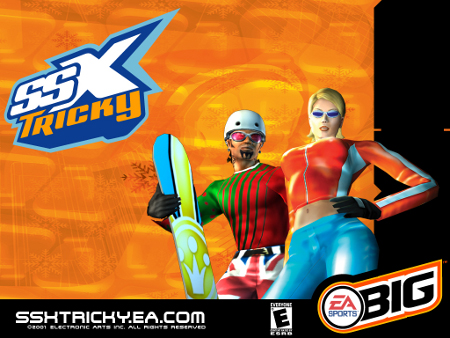
The adaptive music was a natural progression from the earlier days of NFS where Alistair Hirst was a real driving force for going interactive with the compositions. Writing and producing music adaptively back in the early days was very time consuming, and to be honest, very exhausting at times, but definitely paid off when you saw and heard it come together in the end. It changed the way you would compose, and definitely changed the way you would arrange. There were creative ways you had to think and lots of testing to figure out the best arrangement for a song, so that it would technically work, and still sound musically pleasing.
Chris: Following this role, you have gone on to become a specialist in developing interactive music systems for video games. Could you elaborate on your other main innovations and achievements in this area, for example on the Full Auto series?
Rom Di Prisco: Full Auto was a very ambitious project from an audio standpoint. I worked closely with the team at Pseudo Interactive to try and create something new and exciting with adaptive music. It was awesome working with the development team — there were so many talented people at Pseudo, and they very much wanted to push the envelope when it came to audio.
We created an adaptive music system that changed dynamically with your position in the race, with the amount of violence and destruction you were causing with your car-mounted weapons, and also with the time remaining in the race and how many laps were left. I had mapped out loads of scenarios in my DAW; instead of chopping up lots of little chunks of music, we decided to work with multiple streams of music (quite a lot of them actually), mixing between them, as well as utilizing other musical elements and sound design that helped with the transitions.
There was a lot of stuff going on, and although it was amazing when it worked, there was plenty of room for things to go wrong without the perfect mix in the end, and alas the schedule didn't allow for perfecting the mix. The sound levels that shipped in the final product were not the greatest. When music is drowned out by engines and explosions, no matter what the music is, it's going to sound not so great if it's too quiet and just droning in the background.
We had a chance to perfect the technology and give it another go in Full Auto 2, but it turned out to be just as rushed as the first release, and although the adaptive music system was sounding a lot better, the shipped mix levels were not showcasing the music the way it should have. I've heard from many fans who have emailed me that, once you go in and change the in-game volume sliders, the music can actually sound pretty cool at times. With the technology already in place and working quite well, if there had been a Full Auto 3, I think we would have finally nailed it. There were further ideas that we planned as well, like taking licensed music, getting access to the multitracks, and having the player remix the licensed music on the fly with the way they decided to play the game.
Chris: The score for SpyHunter 2 reflected your talent for creating intense hybridised music. Could you elaborate on the sampling techniques you used to establish the gritty and aggressive sound of this score? What are the challenges are hybridising multiple forces in scores such as this one?
Rom Di Prisco: For the SpyHunter 2 project I was actually running all my non-synth sounds and guitars off of many different samplers in real time, so that I had full control over the mix to do more interesting arrangements that wouldn't have been possible had those elements been simply recorded to audio. Midway had secured the rights to use the Peter Gunn Theme, and it was great to remix and incorporate that into the soundtrack as well. A lot of the aggressive synths were run through guitar amps to get their unique sound.
Many different genres were all combined at once, and getting the right balance between big orchestral themes, metal guitars, and electronics can definitely be a little tricky. It required very creative use of compressors, and lots of precise EQing to cut the right frequencies so that the various elements did not fight with each other. It's awesome working on soundtracks like that because you always come out with added knowledge and new techniques that you might not have otherwise tried.
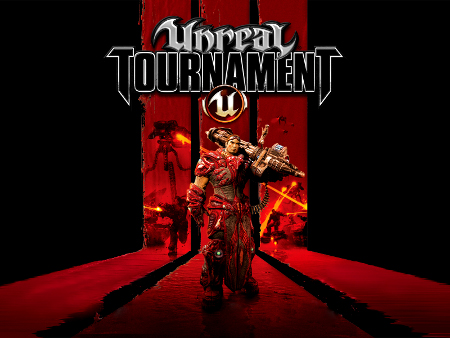
Chris: Away from racing games, you are well-regarded for composing the music for Dead Man's Hand that you mentioned earlier. Was it a refreshing challenge to compose for this title? How were you able to convey the Old West setting while matching the dynamic gameplay of this title?
Rom Di Prisco: Yes, very refreshing. I absolutely loved the challenge of Dead Man's Hand. I hired quite a few session musicians to help convey the proper feeling for that title. Electronics were mixed with live harmonica, banjos, mandolin, various guitars, bass, jaw harp, piccolos and flutes. It's nice to mix things up a bit, and I really enjoyed working on it. It inspired me for future projects to bring in more live instruments and try out new recording techniques and experimentation.
Chris: You were able to channel your talents in electronic music once more as lead composer of the smash hit Unreal Tournament III. How did you capture the atmosphere and action of the shooter with your score for this title? Were past scores in the series particularly influential to you?
Rom Di Prisco: Capturing the atmosphere for Unreal Tournament III was a lot of fun, and fit my personal style very well. There was actually about a year or so of just bouncing ideas back and forth with Epic, and Audio Director Mike Larson, and they had lots of fantastic feedback and direction. We tried many different styles and ideas before landing on the final mix that suited the game. It was cool to have the time to just bang out exactly what was going to be needed and to properly get it all sorted. I was given access to artwork and screenshots which really helped set the mood, and I played a lot of previous Unreal Tournament titles on my laptop in my studio right as I was composing, to make sure I always captured the perfect feel.
Epic are the best in the biz, so it was obviously amazing to work on a project of this caliber. Capturing the vibe of the whole series' universe was very important to me, and definitely would not be accomplished without including elements of previous soundtracks. Past scores were extremely influential, and there were many nods to previous games and past music in the material I composed, as well as many remixes and remakes of classic Unreal Tournament tracks.
Chris: In December 2010, you released your debut solo album Cryptidalia for free through your official website. Could you elaborate on the inspiration and concept of this abstractly styled and titled album?
Rom Di Prisco: Abstractly styled and titled album... I like that! Over the years I've done many game soundtracks, worked with various bands, produced music releases under different aliases, and loads of remix and production work as well... I just thought it was time to finally release something under my own name. I wanted it to be a nod to everything I love. I wanted to incorporate many different elements, but with a flow, a purpose, and reason behind it all, rather than just a collection of songs that are thrown together.
Some of the songs have been in my head for years — not the actual melodies or basslines, but the concepts for how they would be arranged and constructed. The concept for the album has been bouncing around my brain for a long time, and I felt it was finally the right time to make it. It's been a healing process in a way too, since I've had plenty of cancelled projects in recent years, and I've spent a lot of time and energy writing soundtracks that will most likely never be heard. This is definitely the start of something new. I already have the next album half thought out in my head.
The concept for Cryptidalia was to have very high tech, clean production — songs that have many layers and depth to them, although they seem deceptively simply at first, but grow with multiple listening sessions. I was also very adamant to have all the songs completely instrumental, with no vocals, so that I didn't have any room for escape, if you know what I mean... so that I had to focus on getting the arrangement just right.
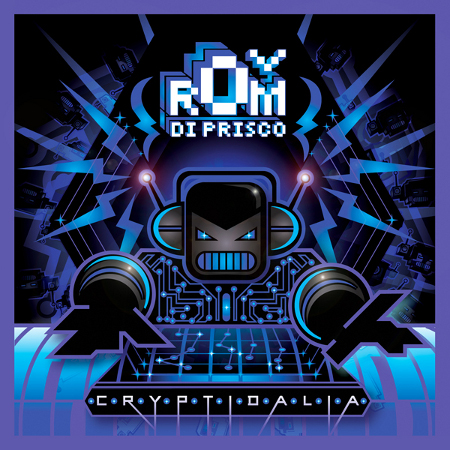
Chris: From a stylistic perspective, much of the music on Cryptidalia is a marked shift from the Need For Speed series with its ambient and experimental focus. To what extent do you agree with this? Are you targeting this album for fans of your soundtrack productions or a wider audience?
Rom Di Prisco: Oh, I totally agree! There are some very experimental and dark tracks on the album — that's just me, and I love that stuff, but at the same time I love pure electronic music too.
Yes, I was targeting the album to be accessible to both audiences. I've already received lots of mail from fans saying that they loved the pure electronic tracks immediately, and skipped through some of the downtempo and ambient material the first time through, but after multiple listens they now love all the slower downtempo tracks better than the more straight up electronica tracks. I find this very interesting.
Chris: Many are also interested in how you produced Cryptidalia from a technological perspective. What technology did you use to create the cutting-edge sounds featured on this release?
Rom Di Prisco: The heart of my studio is a double quad core PC running Cubase 4 with an RME Fireface 800, and Adam A7 speakers with an Adam Sub8. I have a large collection of software, but I like to delve into one thing until I master it, so there's some stuff that hasn't gotten much use yet. As well as all the big name companies, I really like to support and use plugins from smaller independent developers.
All of the sounds on Cryptidalia were created completely from scratch. I didn't use any preset sounds, no drum loops, and every single synth sound was programmed from the ground up. All the drum parts were not only sequenced and programmed from scratch, but were also sound designed and created on drum synths, or recorded live — with the exception of two or three drum samples from Battery 3 (which were tweaked and layered with other material anyway). I played and recorded a lot of guitar and piano parts live, myself, quite often in one take to keep it raw and interesting. I recorded a lot of other live instruments myself too.
I actually have a nice collection of rare and interesting instruments and percussion from around the world, from all different cultures and countries. Many of the strange stringed instruments or weird percussion that you hear are actually real instruments being played, not samples. I also did several sessions in my garage, just banging and smashing things like an old sink, pipes, bamboo sticks, sheets of metal... my dishwasher makes a very eerie sound when it's still wet after a wash cycle, and when you slowly pull the door open just right... that's those crazy squealy sounds in Caverns of Suursonnabu!
Chris: Although you have been relatively quiet from game music production in recent years, you have confirmed that you are working on some new projects. Could you reveal more about your current activities, both score-related and otherwise?
Rom Di Prisco: I have been relatively quiet in regards to game music in the last few years, but the irony is that I have been the busiest I have ever been in the game world.... I worked on a very cool project for a year called Prodigal, which was a driving game with gothic and horror elements — it was looking amazing and was ahead of it's time, but unfortunately the project was cancelled. I then worked on another big project for another year for a very big name developer, and I was extremely excited about it, but alas this project is currently on hold.

There have been a couple other games I was involved with which also were cancelled. The economy has not been very friendly in recent years. I also worked with the very talented people at United Front Games and Audio Director, Michelle Frey, composing music for ModNation Racers for about a year before the direction of the project changed, and my music unfortunately didn't fit the new musical direction in the end. I have a new project that I have finished the score for, but it hasn't been announced; I am not allowed to talk about it just yet. I also recently did a little work for some very cool indie games which should be out this year.
The cancelled games were another reason why I thought it was the right time to release my first solo album. I have written so much music over the last few years, but much of it will never be heard, and since I am not legally allowed to showcase it anywhere, I wanted to have something to give to my fans that have been waiting patiently for something new.
Chris: Finally, do you have anything you'd like to say to fans and readers around the world? Many thanks for your time.
Rom Di Prisco: Thanks very much for the great questions, and for inviting me to do this interview Chris. It's been a pleasure! I would like to say a big thank you to all my fans and supporters of my music, and to anybody who took the time to read this interview. :) Stay tuned... there might be some more new music releases coming soon!